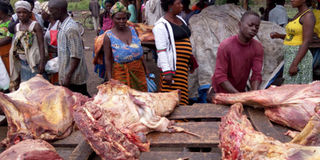‘Imported’ meat splits leaders

Traders sell “sanga” meat at Kibara Trading Centre in Nyakiyumbu Sub-county, Kasese District last week. PHOTO BY ENID NINSIIMA
Kasese- There is prolonged bickering among Kasese District political leadership over the sale of meat, commonly known as ‘sanga meat’.
The cheap beef, desired more by the average locals, is displayed on stalls in rural trading centres.
Each kilogramme is sold at between Shs3,000 and Shs4,000, compared to Shs8,000 at other butcheries.
No one in the district knows the exact origin of the meat but local dealers suspect they purchase it from “Sanga” Town in Kiruhura District. That is why consumers call it “sanga” meat.
Kasese District Council last month resolved to ban it from the local markets saying it is unfit for human consumption.
But this resolution may not easily be implemented following resistance from some of the Members of Parliament and local leadership of the three affected sub-counties in Bukonzo West County.
The meat has its holding market at Kibara Trading Centre on the Kasese-Bwera highway in Nyakiyumbu Sub-county.
The local dealers from Nyakiyumbu, Isango and Bwera sub-counties, among other areas in Bukonzo West constituency, purchase the meat here.
The fight against this meat has pitted Kasese District chairman Geoffrey Sibendire Bigogo and his council against the other leaders who are in support of the business.
“I want all political leaders who wish good for the people of Kasese to rally behind me in the fight against the importation and sale of sanga meat since it has been proved to be a health threat to the people of Kasese. There is an increase in the number of cases of brucellosis at Bwera Hospital which is a result of people eating unclean meat,” Mr Bigogo says.
The study
Mr Bigogo says his council acted on a technical report following a study by the veterinary department on the safety of the meat.
He, however, faults the MPs and local leaders, who he said are “feeding well”, of seeking cheap popularity by inciting the residents to oppose the district resolution.
During the council meeting that resolved to ban the sale of “sanga meat”, it was observed that such animals, if not sick or found dead, might have been stolen from the farms in Kiruhura.
Mr Bigogo wonders why rejected animal and fish products always find market in Kasese.
The district boss notes that he had written to area authorities expressing his disappointment over what he called “garbage dumping”.
Ms Mary Muhindo, a resident of Karambi and meat seller, is also unhappy with the ban.
“I have been selling this meat for the last five years but I have never heard such complaints. I wonder why they are coming up now,” she says.
Mr Peter Baluku, a father of 10 children from Mundongo Village says: “We have been depending on that meat for long and have never fallen sick as alleged. It is affordable for a peasant.”
But Mr Sande Kakule, the LC III chairperson of Nyakiyumbu Sub-county, faults the district leadership for lack of information about the delicacy, saying traders have genuine permits to transport meat between districts.
“They [council] only acted on hearsay and rumours [to pass such a declaration]. Why can’t they come on the ground and find out the clear picture instead of making such malicious comments?” Mr Kakule asks.
Mr Wilson Agaba, the chairperson of Isango Sub-county, also weighs in on the matter, tasking the district leadership to consider the low incomes of his community before banning sale of the meat.
Baseless
Bukonzo West MP Godfrey Atkins Katusabe describes the district resolution as “baseless and lacks technical backup”.
He asked his constituents to continue feeding on sanga meat because it is affordable to them.
After touring the affected areas, Woman MP Winfred Kiiza last month told residents not to back off, saying the district needs to provide alternatives for them before stopping the sale.
The Kasese deputy Resident District Commissioner, Mr Aminadabu Muhindo, says the district council “generalised” the issue by banning the meat before finding out what is fit and what is unfit for human consumption.
Expert views
No permits: Kasese District veterinary officer, Dr Godfrey Kalule, has says there is no trader or dealer with documents authorising them to import the meat to the district. He says Kasese district issues permits to traders who bring animals to the area.
Frustrated: He says the meat is not good at all for human consumption but their efforts have been let down by political leaders and residents who had resisted the efforts to have it stopped.
Warning: The district health officer, Dr Yusuf Baseke, warns the people against the sanga meat saying it is not good at all for human consumption given the handling process, storage and transportation.
Treatment: The medical superintendent at Bwera Hospital, Dr Alphonse Gatare, says the facility receives about 10 cases of brucellosis per month. He suspects sanga meat is the cause.
Cost: The health officials note that brucellosis is expensive to treat with a doze going for up to Shs700,000.



